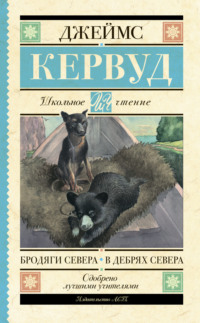 полная версия
полная версияThe Valley of Silent Men
"Bully!" exclaimed Kent. "We're getting there fast! And now, why?"
The girl drew her chair a few inches nearer, and for a moment Kent thought that her lovely mouth was trembling on the edge of a smile.
"Because you have lied so splendidly to save another man who was about to die."
"Et tu, Brute!" sighed Kent, leaning back against his pillows. "Isn't it possible for a decent man to kill another man and not be called a liar when he tells about it? Why do so many believe that I lie?"
"They don't," said the girl. "They believe you – now. You have gone so completely into the details of the murder in your confession that they are quite convinced. It would be too bad if you lived, for you surely would be hanged. Your lie sounds and reads like the truth. But I know it is a lie. You did not kill John Barkley."
"And the reason for your suspicion?"
For fully half a minute the girl's eyes rested on, his own. Again they seemed to be looking through him and into him. "Because I know the man who DID kill him," she said quietly, "and it was not you."
Kent made a mighty effort to appear calm. He reached for a cigar from the box that Cardigan had placed on his bed, and nibbled the end of it. "Has some one else been confessing?" he asked.
She shook her head the slightest bit.
"Did you – er – see this other gentleman kill John Barkley?" he insisted.
"No."
"Then I must answer you as I have answered at least one other. I killed John Barkley. If you suspect some other person, your suspicion is wrong."
"What a splendid liar!" she breathed softly. "Don't you believe in God?"
Kent winced. "In a large, embracing sense, yes," he said. "I believe in Him, for instance, as revealed to our senses in all that living, growing glory you see out there through the window Nature and I have become pretty good pals, and you see I've sort of built up a mother goddess to worship instead of a he-god. Sacrilege, maybe, but it's a great comfort at times. But you didn't come to talk religion?"
The lovely head bent still nearer him. He felt an impelling desire to put up his hand and touch her shining hair, as she laid her hand on his forehead.
"I know who killed John Barkley," she insisted. "I know how and when and why he was killed. Please tell me the truth. I want to know. Why did you confess to a crime which you did not commit?"
Kent took time to light his cigar. The girl watched him closely, almost eagerly.
"I may be mad," he said. "It is possible for any human being to be mad and not know it. That's the funny part about insanity. But if I'm not insane, I killed Barkley; if I didn't kill him, I must be insane, for I'm very well convinced that I did. Either that, or you are insane. I have my suspicions that you are. Would a sane person wear pumps with heels like those up here?" He pointed accusingly to the floor.
For the first time the girl smiled, openly, frankly, gloriously. It was as if her heart had leaped forth for an instant and had greeted him. And then, like sunlight shadowed by cloud, the smile was gone. "You are a brave man," she said. "You are splendid. I hate men. But I think if you lived very long, I should love you. I will believe that you killed Barkley. You compel me to believe it. You confessed, when you found you were going to die, that an innocent man might be saved. Wasn't that it?"
Kent nodded weakly. "That's it. I hate to think of it that way, but I guess it's true. I confessed because I knew I was going to die. Otherwise I am quite sure that I should have let the other fellow take my medicine for me. You must think I am a beast."
"All men are beasts," she agreed quickly. "But you are – a different kind of beast. I like you. If there were a chance, I might fight for you. I can fight." She held up her two small hands, half smiling at him again.
"But not with those," he exclaimed. "I think you would fight with your eyes. O'Connor told me they half killed Kedsty when you met them in the poplar grove yesterday."
He had expected that the mention of Inspector Kedsty's name would disturb her. It had no effect that he could perceive.
"O'Connor was the big, red-faced man with Mr. Kedsty?"
"Yes, my trail partner. He came to me yesterday and raved about your eyes. They ARE beautiful; I've never seen eyes half so lovely. But that wasn't what struck Bucky so hard. It was the effect they had on Kedsty. He said they shattered every nerve in Kedsty's body, and Kedsty isn't the sort to get easily frightened. And the queer part of it was that the instant you had gone, he gave O'Connor an order to free McTrigger – and then turned and followed you. All the rest of that day O'Connor tried to discover something about you at the Landing. He couldn't find hide nor hair – I beg pardon! – I mean he couldn't find out anything about you at all. We made up our minds that for some reason or other you were hiding up at Kedsty's bungalow. You don't mind a fellow saying all this – when he is going to pop off soon – do you?"
He was half frightened at the directness with which he had expressed the thing. He would gladly have buried his own curiosity and all of O'Connor's suspicions for another moment of her hand on his forehead. But it was out, and he waited.
She was looking down, her fingers twisting some sort of tasseled dress ornament in her lap, and Kent mentally measured the length of her lashes with a foot rule in mind. They were superb, and in the thrill of his admiration he would have sworn they were an inch long. She looked up suddenly and caught the glow in his eyes and the flush that lay under the tan of his cheeks. Her own color had deepened a little.
"What if you shouldn't die?" she asked him bluntly, as if she had not heard a word of all he had said about Kedsty. "What would you do?"
"I'm going to."
"But if you shouldn't?"
Kent shrugged his shoulders. "I suppose I'd have to take my medicine. You're not going?"
She had straightened up and was sitting on the edge of her chair. "Yes, I'm going. I'm afraid of my eyes. I may look at you as I looked at Mr. Kedsty, and then – pop you'd go, quick! And I don't want to be here when you die!"
He heard a soft little note of laughter in her throat. It sent a chill through him. What an adorable, blood-thirsty little wretch she was! He stared at her bent head, at the shining coils of her wonderful hair. Undone, he could see it completely hiding her. And it was so soft and warm that again he was tempted to reach out and touch it. She was wonderful, and yet it was not possible that she had a heart. Her apparent disregard of the fact that he was a dying man was almost diabolic. There was no sympathy in the expression of her violet eyes as she looked at him. She was even making fun of the fact that he was about to die!
She stood up, surveying for the first time the room in which she had been sitting. Then she turned to the window and looked out. She reminded Kent of a beautiful young willow that had grown at the edge of a stream, exquisite, slender, strong. He could have picked her up in his arms as easily as a child, yet he sensed in the lithe beauty of her body forces that could endure magnificently. The careless poise of her head fascinated him. For that head and the hair that crowned it he knew that half the women of the earth would have traded precious years of their lives.
And then, without turning toward him, she said, "Some day, when I die, I wish I might have as pleasant a room as this."
"I hope you never die," he replied devoutly.
She came back and stood for a moment beside him.
"I have had a very pleasant time," she said, as though he had given her a special sort of entertainment. "It's too bad you are going to die. I'm sure we should have been good friends. Aren't you?"
"Yes, very sure. If you had only arrived sooner – "
"And I shall always think of you as a different kind of man-beast," she interrupted him. "It is really true that I shouldn't like to see you die. I want to get away before it happens. Would you care to have me kiss you?"
For an instant Kent felt that his aorta was about to give away. "I – I would," he gasped huskily.
"Then – close your eyes, please."
He obeyed. She bent over him. He felt the soft touch of her hands and caught for an instant the perfume of her face and hair, and then the thrill of her lips pressed warm and soft upon his.
She was not flushed or embarrassed when he looked at her again. It was as if she had kissed a baby and was wondering at its red face. "I've only kissed three men before you," she avowed. "It is strange. I never thought I should do it again. And now, good-by!" She moved quickly to the door.
"Wait," he cried plaintively. "Please wait. I want to know your name. It is Marette – "
"Radisson," she finished for him. "Marette Radisson, and I come from away off there, from a place we call the Valley of Silent Men." She was pointing into the north.
"The North!" he exclaimed.
"Yes, it is far north. Very far."
Her hand was on the latch. The door opened slowly.
"Wait," he pleaded again. "You must not go."
"Yes, I must go. I have remained too long. I am sorry I kissed you. I shouldn't have done that. But I had to because you are such a splendid liar!"
The door opened quickly and closed behind her. He heard her steps almost running down the hall, where not long ago he had listened to the last of O'Connor's.
And then there was silence, and in that silence he heard her words again, drumming like little hammers in his head, Because you are such a splendid liar!"
CHAPTER VI
James Kent, among his other qualities good and bad, possessed a merciless opinion of his own shortcomings, but never, in that opinion, had he fallen so low as in the interval which immediately followed the closing of his door behind the mysterious girl who had told him that her name was Marette Radisson. No sooner was she gone than the overwhelming superiority of her childlike cleverness smote him until, ashamed of himself, he burned red in his aloneness.
He, Sergeant Kent, the coolest man on the force next to Inspector Kedsty, the most dreaded of catechists when questioning criminals, the man who had won the reputation of facing quietly and with deadly sureness the most menacing of dangers, had been beaten – horribly beaten – by a girl! And yet, in defeat, an irrepressible and at times distorted sense of humor made him give credit to the victor. The shame of the thing was his acknowledgment that a bit of feminine beauty had done the trick. He had made fun of O'Connor when the big staff-sergeant had described the effect of the girl's eyes on Inspector Kedsty. And, now, if O'Connor could know of what had happened here —
And then, like a rubber ball, that saving sense of humor bounced up out of the mess, and Kent found himself chuckling as his face grew cooler. His visitor had come, and she had gone, and he knew no more about her than when she had entered his room, except that her very pretty name was Marette Radisson. He was just beginning to think of the questions he had wanted to ask, a dozen, half a hundred of them – more definitely who she was; how and why she had come to Athabasca Landing; her interest in Sandy McTrigger; the mysterious relationship that must surely exist between her and Inspector Kedsty; and, chiefly, her real motive in coming to him when she knew that he was dying. He comforted himself by the assurance that he would have learned these things had she not left him so suddenly. He had not expected that.
The question which seated itself most insistently in his mind was, why had she come? Was it, after all, merely a matter of curiosity? Was her relationship to Sandy McTrigger such that inquisitiveness alone had brought her to see the man who had saved him? Surely she had not been urged by a sense of gratitude, for in no way had she given expression to that. On his death-bed she had almost made fun of him. And she could not have come as a messenger from McTrigger, or she would have left her message. For the first time he began to doubt that she knew the man at all, in spite of the strange thing that had happened under O'Connor's eyes. But she must know Kedsty. She had made no answer to his half-accusation that she was hiding up at the Inspector's bungalow. He had used that word – "hiding." It should have had an effect. And she was as beautifully unconscious of it as though she had not heard him, and he knew that she had heard him very distinctly. It was then that she had given him that splendid view of her amazingly long lashes and had countered softly,
"What if you shouldn't die?"
Kent felt himself suddenly aglow with an irresistible appreciation of the genius of her subtlety, and with that appreciation came a thrill of deeper understanding. He believed that he knew why she had left him so suddenly. It was because she had seen herself close to the danger-line. There were things which she did not want him to know or question her about, and his daring intimation that she was hiding in Kedsty's bungalow had warned her. Was it possible that Kedsty himself had sent her for some reason which he could not even guess at? Positively it was not because of McTrigger, the man he had saved. At least she would have thanked him in some way. She would not have appeared quite so adorably cold-blooded, quite so sweetly unconscious of the fact that he was dying. If McTrigger's freedom had meant anything to her, she could not have done less than reveal to him a bit of sympathy. And her greatest compliment, if he excepted the kiss, was that she had called him a splendid liar!
Kent grimaced and drew in a deep breath because of the tightness in his chest. Why was it that every one seemed to disbelieve him? Why was it that even this mysterious girl, whom he had never seen before in his life, politely called him a liar when he insisted that he had killed John Barkley? Was the fact of murder necessarily branded in one's face? If so, he had never observed it. Some of the hardest criminals he had brought in from the down-river country were likable-looking men. There was Horrigan, for instance, who for seven long weeks kept him in good humor with his drollery, though he was bringing him in to be hanged. And there were McTab, and le Bête Noir– the Black Beast – a lovable vagabond in spite of his record, and Le Beau, the gentlemanly robber of the wilderness mail, and half a dozen others he could recall without any effort at all. No one called them liars when, like real men, they confessed their crimes when they saw their game was up. To a man they had given up the ghost with their boots on, and Kent respected their memory because of it. And he was dying – and even this stranger girl called him a liar? And no case had ever been more complete than his own. He had gone mercilessly into the condemning detail of it all. It was down in black and white. He had signed it. And still he was disbelieved. It was funny, deuced funny, thought Kent.
Until young Mercer opened the door and came in with his late breakfast, he had forgotten that he had really been hungry when he awakened with Cardigan's stethoscope at his chest. Mercer had amused him from the first. The pink-faced young Englishman, fresh from the old country, could not conceal in his face and attitude the fact that he was walking in the presence of the gallows whenever he entered the room. He was, as he had confided in Cardigan, "beastly hit up" over the thing. To feed and wash a man who would undoubtedly die, but who would be hanged by the neck until he was dead if he lived, filled him with peculiar and at times conspicuous emotions. It was like attending to a living corpse, if such a thing could be conceived. And Mercer had conceived it. Kent had come to regard him as more or less of a barometer giving away Cardigan's secrets. He had not told Cardigan, but had kept the discovery for his own amusement.
This morning Mercer's face was less pink, and his pale eyes were paler, Kent thought. Also he started to sprinkle sugar on his eggs in place of salt.
Kent laughed and stopped his hand. "You may sugar my eggs when I'm dead, Mercer," he said, "but while I'm alive I want salt on 'em! Do you know, old man, you look bad this morning. Is it because this is my last breakfast?"
"I hope not, sir, I hope not," replied Mercer quickly. "Indeed, I hope you are going to live, sir."
"Thanks!" said Kent dryly. "Where is Cardigan?"
"The Inspector sent a messenger for him, sir. I think he has gone to see him. Are your eggs properly done, sir?"
"Mercer, if you ever worked in a butler's pantry, for the love of heaven forget it now!" exploded Kent, "I want you to tell me something straight out. How long have I got?"
Mercer fidgeted for a moment, and a shade or two more of the red went out of his face. "I can't say, sir. Doctor Cardigan hasn't told me. But I think not very long, sir. Doctor Cardigan is cut up all in rags this morning. And Father Layonne is coming to see you at any moment."
"Much obliged," nodded Kent, calmly beginning his second egg. "And, by the way, what did you think of the young lady?"
"Ripping, positively ripping!" exclaimed Mercer.
"That's the word," agreed Kent. "Ripping. It sounds like the calico counter in a dry-goods store, but means a lot. Don't happen to know where she is staying or why she is at the Landing, do you?"
He knew that he was asking a foolish question and scarcely expected an answer from Mercer. He was astonished when the other said:
"I heard Doctor Cardigan ask her if we might expect her to honor us with another visit, and she told him it would be impossible, because she was leaving on a down-river scow tonight. Fort Simpson, I think she said she was going to, sir."
"The deuce you say!" cried Kent, spilling a bit of his coffee in the thrill of the moment. "Why, that's where Staff-Sergeant O'Connor is bound for!"
"So I heard Doctor Cardigan tell her. But she didn't reply to that. She just – went. If you don't mind a little joke in your present condition, sir, I might say that Doctor Cardigan was considerably flayed up over her. A deuced pretty girl, sir, deuced pretty! And I think he was shot through!"
"Now you're human, Mercer. She was pretty, wasn't she?"
"Er – yes – stunningly so, Mr. Kent," agreed Mercer, reddening suddenly to the roots of his pasty, blond hair. "I don't mind confessing that in this unusual place her appearance was quite upsetting."
"I agree with you, friend Mercer," nodded Kent. "She upset me. And – see here, old man! – will you do a dying man the biggest favor he ever asked in his life?"
"I should be most happy, sir, most happy."
"It's this," said Kent. "I want to know if that girl actually leaves on the down-river scow tonight. If I'm alive tomorrow morning, will you tell me?"
"I shall do my best, sir."
"Good. It's simply the silly whim of a dying man, Mercer. But I want to be humored in it. And I'm sensitive – like yourself. I don't want Cardigan to know. There's an old Indian named Mooie, who lives in a shack just beyond the sawmill. Give him ten dollars and tell him there is another ten in it if he sees the business through, and reports properly to you, and keeps his mouth shut afterward. Here – the money is under my pillow."
Kent pulled out a wallet and put fifty dollars in Mercer's hands.
"Buy cigars with the rest of it, old man. It's of no more use to me. And this little trick you are going to pull off is worth it. It's my last fling on earth, you might say."
"Thank you, sir. It is very kind of you."
Mercer belonged to a class of wandering Englishmen typical of the Canadian West, the sort that sometimes made real Canadians wonder why a big and glorious country like their own should cling to the mother country. Ingratiating and obsequiously polite at all times, he gave one the impression of having had splendid training as a servant, yet had this intimation been made to him, he would have become highly indignant. Kent had learned their ways pretty well. He had met them in all sorts of places, for one of their inexplicable characteristics was the recklessness and apparent lack of judgment with which they located themselves. Mercer, for instance, should have held a petty clerical job of some kind in a city, and here he was acting as nurse in the heart of a wilderness!
After Mercer had gone with the breakfast things and the money, Kent recalled a number of his species. And he knew that under their veneer of apparent servility was a thing of courage and daring which needed only the right kind of incentive to rouse it. And when roused, it was peculiarly efficient in a secretive, artful-dodger sort of way. It would not stand up before a gun. But it would creep under the mouths of guns on a black night. And Kent was positive his fifty dollars would bring him results – if he lived.
Just why he wanted the information he was after, he could not have told himself. It was a pet aphorism between O'Connor and him that they had often traveled to success on the backs of their hunches. And his proposition to Mercer was made on the spur of one of those moments when the spirit of a hunch possessed him. His morning had been one of unexpected excitement, and now he leaned back in an effort to review it and to forget, if he could, the distressing thing that was bound to happen to him within the next few hours. But he could not get away from the thickening in his chest. It seemed growing on him. Now and then he was compelled to make quite an effort to get sufficient air into his lungs.
He found himself wondering if there was a possibility that the girl might return. For a long time he lay thinking about her, and it struck him as incongruous and in bad taste that fate should have left this adventure for his last. If he had met her six months ago – or even three – it was probable that she would so have changed the events of life for him that he would not have got the half-breed's bullet in his chest. He confessed the thing unblushingly. The wilderness had taken the place of woman for him. It had claimed him, body and soul. He had desired nothing beyond its wild freedom and its never-ending games of chance. He had dreamed, as every man dreams, but realities and not the dreams had been the red pulse of his life. And yet, if this girl had come sooner —
He revisioned for himself over and over again her hair and eyes, the slimness of her as she had stood at the window, the freedom and strength of that slender body, the poise of her exquisite head, and he felt again the thrill of her hand and the still more wonderful thrill of her lips as she had pressed them warmly upon his.
And she was of the North! That was the thought that overwhelmed him. He did not permit himself to believe that she might have told him an untruth. He was confident, if he lived until tomorrow, that Mercer would corroborate his faith in her. He had never heard of a place called the Valley of Silent Men, but it was a big country, and Fort Simpson with its Hudson Bay Company's post and its half-dozen shacks was a thousand miles away. He was not sure that such a place as that valley really existed. It was easier to believe that the girl's home was at Fort Providence, Fort Simpson, Fort Good Hope, or even at Fort McPherson. It was not difficult for him to picture her as the daughter of one of the factor lords of the North. Yet this, upon closer consideration, he gave up as unreasonable. The word "Fort" did not stand for population, and there were probably not more than fifty white people at all the posts between the Great Slave and the Arctic. She was not one of these, or the fact would have been known at the Landing.
Neither could she be a riverman's daughter, for it was inconceivable that either a riverman or a trapper would have sent this girl down into civilization, where this girl had undoubtedly been. It was that point chiefly which puzzled Kent. She was not only beautiful. She had been tutored in schools that were not taught by wilderness missioners. In her, it seemed to him, he had seen the beauty and the wild freedom of the forests as they had come to him straight out of the heart of an ancient aristocracy that was born nearly two hundred years ago in the old cities of Quebec and Montreal.
His mind flashed back at that thought: he remembered the time when he had sought out every nook and cranny of that ancient town of Quebec, and had stood over graves two centuries old, and deep in his soul had envied the dead the lives they had lived. He had always thought of Quebec as a rare old bit of time-yellowed lace among cities – the heart of the New World as it had once been, still beating, still whispering of its one-time power, still living in the memory of its mellowed romance, its almost forgotten tragedies – a ghost that lived, that still beat back defiantly the destroying modernism that would desecrate its sacred things. And it pleased him to think of Marette Radisson as the spirit of it, wandering north, and still farther north – even as the spirits of the profaned dead had risen from the Landing to go farther on.









